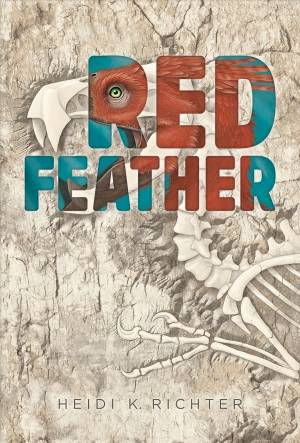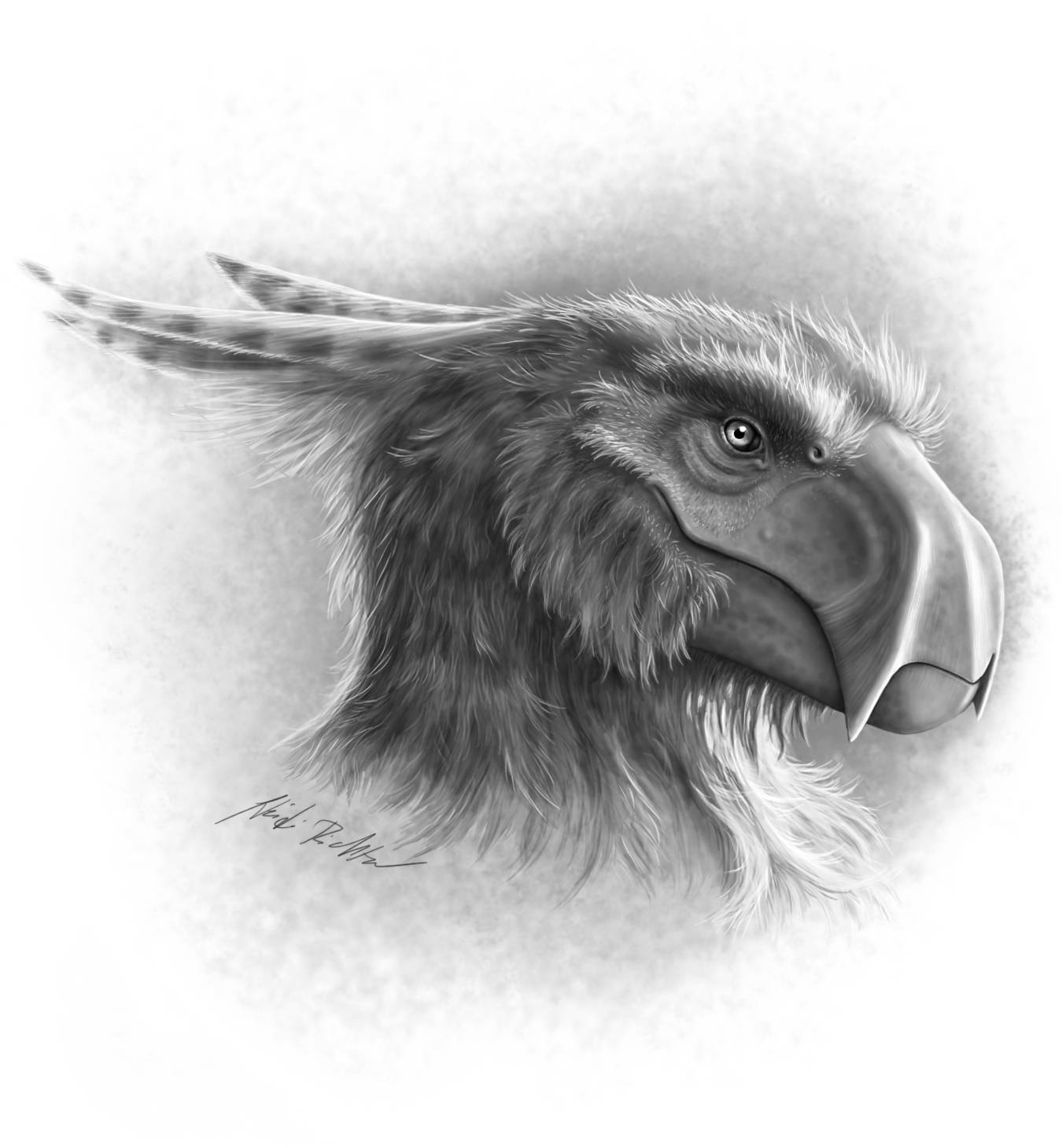Redfeather is a word loaded with meaning depending on context; it can bring to mind a ubiquitous state bird, a charged racial stereotype, a sportsball rival, or even a conflagration. Within the world of this new novel by local author Heidi K. Richter, it also takes on a couple additional layers of meaning. It is the name of two pivotal characters in the book: the point-of-view protagonist, Carrie Red Feather, and another climactic character who was meant to be a bridge to a new future for an old species.
The animals which come to be known as Saberbeaks are more than sixty-five million years old – in this speculative universe – and intelligent enough to keep their existence hidden from humans. These dinosaurs that are halfway between lizards and birds have opposable thumbs and written language, survived the comet that wiped out most life on the planet, and have a system of government. Redfeather explores what happens when an ancient race meets the human threat in an exciting mystery driven by animal rights activists and academics, that results in a thought-provoking read.
 The author grew up in North Dakota, raised with Native American friends. Making the main character the product of a mixed-marriage was clearly meant to illustrate the similarities between what happened in the early history of the states and the discovery of the Saberbeaks. The lizard-birds were wary of all humans, took pains to hide themselves from us, and only revealed themselves when a violent faction had the opportunity to kill several visitors to their island. The tale that follows is one of attempted peace, accidental violence, misunderstanding and unjust imprisonment leading to almost certain genocide. It definitely hits all the historical-allegory notes and makes the reader stop to think about what might happen if these events were able to be repeated today: would we actually behave better than our ancestors?
The author grew up in North Dakota, raised with Native American friends. Making the main character the product of a mixed-marriage was clearly meant to illustrate the similarities between what happened in the early history of the states and the discovery of the Saberbeaks. The lizard-birds were wary of all humans, took pains to hide themselves from us, and only revealed themselves when a violent faction had the opportunity to kill several visitors to their island. The tale that follows is one of attempted peace, accidental violence, misunderstanding and unjust imprisonment leading to almost certain genocide. It definitely hits all the historical-allegory notes and makes the reader stop to think about what might happen if these events were able to be repeated today: would we actually behave better than our ancestors?
Though leading me down this line of thought made me notice that a bigger question provoked by the plotline was not even touched upon during the story. Not one page was dedicated to the debate about whether these beings qualify as “people”. A sentient race of lizards with opposable thumbs exists, who write, learn, and reason. Brief mention was made of them coming to the U.S. to sign a peace treaty (p. 139), but after an altercation while here, the visitors are detained in a zoo enclosure for nearly two years. All of them – not just the ones involved in the event – and the ones who escape are wanted fugitives. None of the animals are asked for a statement, and while there is reference to protestors (I’m sure for both sides of the issue), judgment seems to be decided upon and meted out by zoo staff as opposed to legislators. There is no trial or hearing. Even though this author is a scientist as opposed to a lawyer, this question kept circling in my brain, making it difficult for me to keep reading.
Alternately, if thinking deeply isn’t your style, Redfeather definitely contains enough plot and excitement to keep your mind off the bigger issues. First, there is the thrill of discovering a completely amazing set of fossils at an archaeological dig. The audience will feel motivated to keep turning pages to discover more about both the A plot, B plot, and even the hinted romance that thankfully never really develops into the typical sci-fi love triangle. There’s even a segment of survival fiction, for those who enjoy tales of braving the elements. The tension-filled climax rivals that of any action-film standoff, and the vaguely threatening resolution will leave readers with a lovely sense of creeping dread.
For those who prefer to learn while reading, there are plenty of facts presented throughout the novel. This work of speculative fiction is definitely heavy on the sci- side of sci-fi. A lot of attention was paid to describing the mechanics of the newly discovered species. For example, I know much more now about how birds make sounds, especially how they can mimic human speech without having lips. Evolution, genetics and species differentiation are discussed at length, as well. Sometimes the details were fascinating, and in other places these digressions could be distracting, but I do feel more fully educated after reading Redfeather. Some of the more imaginative adaptations, however, such as passing on lucid memories (p. 273) were just briefly mentioned and could have used a lot more explanation to fit the tone and help the audience understand.
I have to point out as a local reader, I was fairly disappointed that the only reference to UIUC was to mention “Unofficial”. What’s more, the protagonist got dinner that evening in the Green Street location of Papa Del’s and was seated and served promptly, without drunken co-ed incident. I know this is speculative fiction featuring real dinosaurs, but some things stretch reality too far.
 Kidding aside, Redfeather is a book that would have benefited greatly from an editor. Sure, maybe I’m biased, but I also have nearly twenty years’ experience in the book trade. Self -publication opens up opportunities for people to have their work reach an audience without having to beg at the doors of the Big Five, but the flip-side of that coin is that the authors don’t benefit from the experience of those publishers. A red pen would have cut through the run-on sentences and the repetitious sentence structure and syntax that jarred me throughout this work. Discerning readers may find themselves distracted by some of these elements, especially during the opening third of the novel while the scenes are being set and the action is slowly rising.
Kidding aside, Redfeather is a book that would have benefited greatly from an editor. Sure, maybe I’m biased, but I also have nearly twenty years’ experience in the book trade. Self -publication opens up opportunities for people to have their work reach an audience without having to beg at the doors of the Big Five, but the flip-side of that coin is that the authors don’t benefit from the experience of those publishers. A red pen would have cut through the run-on sentences and the repetitious sentence structure and syntax that jarred me throughout this work. Discerning readers may find themselves distracted by some of these elements, especially during the opening third of the novel while the scenes are being set and the action is slowly rising.
The story has a great premise and kept me entertained, and by the time the main picked up, I found it much easier to ignore the problems that initially made it difficult to read Redfeather. There is a lot to enjoy for the speculative-fiction fan, people who enjoyed the Jurassic Park series, or just want to learn a little more about paleontology. Heidi K. Richter has made her debut novel available as an e-book or paperback through amazon, or her author’s website.
About the reviewer…
not just the Arts Editor, rebecca knaur has read thousands of books and spent the last 20 selling, cataloging and recommending even more books. That still doesn’t mean she knows what she’s talking about. Feel free to contact her on either her twitter or goodreads accounts.









 About the reviewer…
About the reviewer…